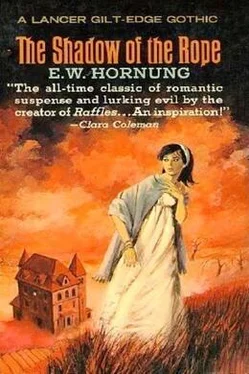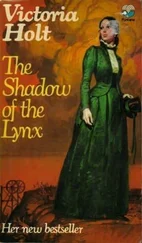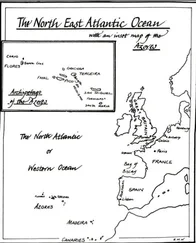Sensitive as all his tribe, and himself both gentle by nature and considerate of others according to his lights, which thoughtlessness might turn down or passion blur, but which burned steadily and brightly in the main, Charles Langholm felt stung to the soul by the last few words, in which Hugh Woodgate noticed nothing amiss. Steel's tone was not openly insulting, but rather that of banter, misplaced perhaps, and in poor taste at such a time, yet ostensibly good–natured and innocent of ulterior meaning. But Langholm was not deceived. There was an ulterior meaning to him, and a very unpleasant one withal. Yet he did not feel unjustifiably insulted; he looked within, and felt justly rebuked; not for anything he had said or done, but for what he found in his heart at that moment. Langholm entered the drawing–room in profound depression, but his state of mind was no longer due to anything that had just been said.
The scene awaiting him was surely calculated to deepen that dejection. Rachel had left the gentlemen with the proud mien and the unbroken spirit which she had maintained at table without trace of effort; they found her sobbing on Morna Woodgate's shoulder, in distress so poignant and so pitiful that even Steel stopped short upon the threshold. In an instant she was on her feet, the tears still thick in her noble eyes, but the spirit once more alight behind the tears.
"Don't go!" she begged them, in a voice that pierced one heart at least. "Stop and help me, for God's sake! I can't bear it. I am not strong enough. I can only pretend to bear it, for an hour, before the servants. Even that has almost maddened me, the effort, and the shame."
"The shame is on others," said Steel, gravely enough now, "and not on you. And who are those others, I should like to know? And what does it matter what they think or say? A hole–and–corner district like this is not the world!"
Rachel shook her head sadly; her beautiful eyes were dry now, and only the more lustrous for the tears that they had shed. Langholm saw nothing else.
"But it is the world," she asserted. "It is part of the world, and the same thing would happen in any other part. It would happen in London, and everywhere else as soon as I became known. And henceforth I mean to be known!" cried Rachel, wilfully; "there shall be no more hiding who I was, or am; that is the way to make them think the worst when they find out. But is it not disgraceful? I was acquitted, and yet I am to be treated as though I had been merely pardoned. Is that not a disgrace to common humanity?"
"Humanity is not so common as you imagine," remarked Steel.
"It is un–Christian!" cried Hugh Woodgate, with many repetitions of the epithet.
Langholm said nothing. His eyes never left Rachel's face. Neither did she meet them for an instant, nor had she a look for Hugh Woodgate or even for his wife. It was to her husband that Rachel had spoken every word; it was nearest him she stood, in his face only that she gazed.
"Are you going to let the disgrace continue?" she asked him, fiercely.
His answer was natural enough.
"My dear Rachel, what can I do? I never dreamt that it would come out here; it is by the merest fluke that it did."
"But I want it to come out," cried Rachel; "if you mean the fact of my trial and my acquittal. It was a mistake ever to hide either for a moment. Henceforth they shall be no secret."
"Then we cannot prevent the world from thinking and saying what it likes, however uncharitable and unjust. Do be reasonable, and listen to reason, though God knows you can be in no mood for such cold comfort! But I have done my best; I will do my best again. I will sell this place to–morrow. We will go right away somewhere else."
"And then the same thing will happen there! Is that all you can suggest, you who married me after hearing with your own ears every scrap of evidence that they could bring against me?"
"Have you anything better to suggest yourself, Rachel?"
"I have," she answered, looking him full and sternly in the face, in the now forgotten presence of their three guests. "Find out who is guilty, if you really want people to believe that I am not!"
Steel did not start, though there came a day when one at least of the listening trio felt honestly persuaded that he had; as a matter of fact, his lips came more closely together, while his eyes searched those of his wife with a wider stare than was often seen in them, but for two or three seconds at most, before dropping in perplexity to the floor.
"How can I, Rachel?" her husband asked quietly, indeed gently, yet with little promise of acquiescence in his tone. "I am not a detective, after all."
But that was added for the sake of adding something, and was enough to prove Steel ill at ease, to the wife who knew him as no man ever had.
"A detective, no!" said she, readily enough. "But you are a rich man; you could employ detectives; you could clear your wife, if you liked."
"Rachel, you know very well that you are cleared already."
"That is your answer, then!" she cried scornfully, and snatched her eyes from him at last, without waiting for a denial. She was done with him, her face said plainly; he looked at her a moment, then turned aside with a shrug.
But Rachel's eyes went swiftly round the room; they alighted for an instant upon Morna Woodgate, leaning forward upon the sofa where they had sat together, eager, enthusiastic, but impotent as a woman must be; they passed over the vicar, looking stolid as usual, and more than a little puzzled; but at last they rested on Langholm's thin, stooping figure, with untidy head thrust forward towards her, and a light in his dreamy eyes that kindled a new light in her own.
"You, Mr. Langholm!" cried Rachel, taking a quick, short step in his direction. "You, with your plots and your problems that nobody can solve; don't you think you could unravel this one for me?"
Her eyes were radiant now, and their radiance all for him. Langholm felt the heart swimming in his body, the brain in his head. A couple of long–legged strides to meet her nine–tenths of the way, and he had taken Rachel's hand before her husband and her friends.
"Before God," said Langholm, "I'll try!"
Their hands met only to part. There was a sardonic laugh from Rachel's husband.
"Do you forbid me?" demanded Langholm, turning upon him.
"Far from it," said Steel. "I shall be most interested to see you go to work."
"Is that a challenge?"
The two men faced each other, while the third man and the women looked on. It had sounded like a challenge to all but the vicar, though neither of the others had had time to think so before they heard the word and recognized its justice.
"If you like," said Steel, indifferently.
"I accept it as such," rejoined Langholm, dogging the other with his eyes. "And find him I will—the guilty man—if I never write another line—and if the villain is still alive!"
There are eminent men of action who can acquit themselves with equal credit upon the little field of letters, as some of the very best books of late years go to prove. The man of letters, on the other hand, capable of cutting a respectable figure in action, is, one fears, a much rarer type. Langholm was essentially a man of letters. He was at his best among his roses and his books, at his worst in unforeseen collision with the rougher realities of life. But give him time, and he was not the man to run away because his equipment for battle was as short as his confidence in himself; and perhaps such courage as he possessed was not less courageous for the crust of cowardice (mostly moral) through which it always had to break. Langholm had one other qualification for the quest to which he had committed himself, but for which he was as thoroughly unsuited by temperament as by the whole tenor of his solitary life. In addition to an ingenious imagination (a quality with its own defects, as the sequel will show), he had that capacity for taking pains which has no disadvantageous side, though in Langholm's case, for one, it was certainly not a synonym for genius.
Читать дальше











